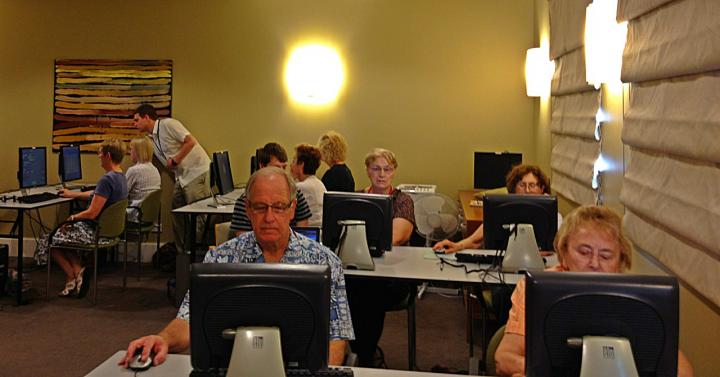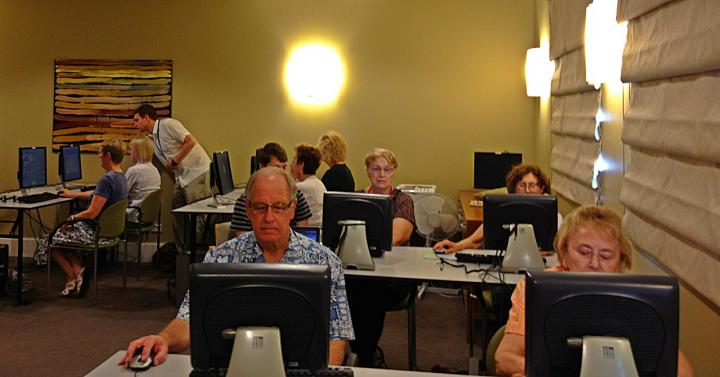
Credit: University of Sydney
Researchers at the University of Sydney have found that engaging in computer-based brain training can improve memory and mood in older adults with mild cognitive impairment – but training is no longer effective once a dementia diagnosis has been made.
The team, comprising researchers from the Brain and Mind Centre , reviewed more than 20 years of research and showed that brain training could lead to improvements in global cognition, memory, learning and attention, as well as psychosocial functioning (mood and self-perceived quality of life) in people with mild cognitive impairment. Conversely, when data from 12 studies of brain training in people with dementia was combined, results were not positive.
The results are published today in the prestigious American Journal of Psychiatry.
Mild cognitive impairment involves a decline in memory and other thinking skills despite generally intact daily living skills, and is one of strongest risk factors for dementia. People with mild cognitive impairment are at one-in-10 risk of developing dementia within a year – and the risk is markedly higher among those with depression.
Brain training is a treatment for enhancing memory and thinking skills by practising mentally challenging computer-based exercises – which are designed to look and feel like video games.
Dr Amit Lampit from the School of Psychology, who led the study said the results showed brain training could play an important role in helping to prevent dementia.
"Our research shows that brain training can maintain or even improve cognitive skills among older people at very high risk of cognitive decline – and it's an inexpensive and safe treatment," Dr Lampit said.
To arrive at their conclusions, the team combined outcomes from 17 randomised clinical trials including nearly 700 participants, using a mathematical approach called meta-analysis, widely recognised as the highest level of medical evidence.
The team has used meta-analysis before to show that brain training is useful in other populations, such as healthy older adults and those with Parkinson's disease.
"Taken together, these wide-ranging analyses have provided the necessary evidence to pursue clinical implementation of brain training in the aged-care sector – while continuing research aimed at improving training effectiveness", Dr Lampit said.
Associate Professor Michael Valenzuela, leader of the Regenerative Neuroscience Group at the Brain and Mind Centre, believes new technology is the key to moving the field forward.
"The great challenges in this area are maintaining training gains over the long term and moving this treatment out of the clinic and into people's homes. " Associate Professor Valenzuela said.
"This is exactly what we are working on right now."
Associate Professor Valenzuela is one of the leaders of the multi-million-dollar Australian Maintain your Brain trial that will test if a tailored program of lifestyle modification, including weekly brain training over four years, can prevent dementia in a group of 18,000 older adults.
###
The new research article is available online: 'Computerized Cognitive Training in Older Adults With Mild Cognitive Impairment or Dementia: A Systematic Review and Meta-Analysis' by Nicole Hill, Loren Mowszowski, Sharon Naismith, Verity Chadwick, Michael Valenzuela and Amit Lampit. American Journal of Psychiatry, 14 Nov 2016. doi: 10.1176/appi.ajp.2016.16030360
NOTES TO EDITORS
What is brain training?
Brain training (or more precisely computerised cognitive training or CCT) is a treatment for enhancing memory and thinking skills by practising mentally challenging exercises on computer. The exercises are designed to look and feel like video games and are based on well-established neuropsychological principles to target specific cognitive domains. Most CCT programs adapt training difficulty so the exercises become harder as performance improves and also provide feedback on progress.
What is a meta-analysis?
A meta-analysis is a statistical technique that begins by searching for all possible studies on a precise question, assessing their quality, and then mathematically combining these to produce an overall numerical result. In general, meta-analyses put more weight on larger or more precise studies and less weight on smaller, less precise studies. Conclusions from a high quality meta-analyses are therefore stronger than those from a single study or from a simple count of 'positive' and 'negative' results. Under some circumstances, meta-analysis allows a researcher to identify fundamental characteristics of the studies that are contributing to the overall pattern of results.
What's the difference between cognitive impairment and dementia?
These concepts tend to lie along a continuum of cognitive function.
Most cognitive domains decline as we get older but there is great variability between individuals and even within our own trajectories over time. This variability increases in later life and so can make the distinction between normal and impaired, or between impaired and dementia, challenging.
Neuropsychological testing can then be useful to find out how they compare to the average person of their age, sex and level of education. If multiple tests for a given cognitive domain point to a result less than the 10th percentile, then they may have an impairment in that domain.
For a diagnosis of dementia, four main conditions need to be satisfied:
- impairment on multiple cognitive domains
- a definite decline in cognitive function
- exclusion of any possible medical causes for this decline, and
- the person is no longer able to carry out day-to-day tasks.
In practice, the last criterion – being able to do one's daily activities independently – is pivotal to distinguishing between cognitive impairment and dementia.
Media Contact
Vivienne Reiner
[email protected]
61-293-512-390
@SydneyUni_Media
http://www.usyd.edu.au/




